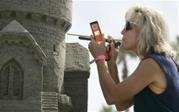
A lesson learned by centuries of beachcombers has been distilled to a physicist's formula: to make the perfect sandcastle, use eight parts sand to one part water.
The physicists' study, released on Wednesday before publication in the journal Nature Physics, is entitled, rather grandly, "Maximum angle of stability of a wet granular pile."
And while it deals with sandcastles, it could also help determine the stability of retaining walls and the material they hold back, one of its authors said.
This study and those that follow on this subject might have implications for those preparing for or recovering from a watery disaster like a hurricane, physicist Arshad Kudrolli said in a telephone interview.
"Our study is the first step, in some sense, in trying to understand what's the most stable angle that one can build, say, a retaining wall," he said. "And if it fails, where would the material end up? How much part of the land will give way?"
Inspired by childhood memories of the seaside, the study's authors worked on a simple model of what makes for the most stable construction involving liquid and particles.
In the case of a sandcastle, builders need to use roughly one-eighth the water to the amount of sand, though Kudrolli said there is a range of possibilities that would work.
"You need a mix of the two to get it right," Kudrolli said in a telephone interview. "It could be more than that, or less than that would be just fine.
"It's very forgiving, so that's why we succeed, I guess," he said with a laugh.
Despite the playful nature of the sandcastle example, Kudrolli noted that their model for what keeps a sandpile from disintegrating could lay the groundwork for questions about what kind of retaining walls would be most stable.
Even though engineers have designed such structures for hundreds of years, the science behind them is not very well developed, Kudrolli said.
The study used "idealized sand" -- glass beads the size of sand grains -- and water, seeing how the piles would stack up and when they would topple.
In an even simpler example of a pile of particles and liquid, Kudrolli and his colleagues envisioned four baseballs, stacked in a pyramid, with three on the bottom and one on top, bonded with "liquid bridges," bits of water that got between and among the baseballs and helped bond them together.